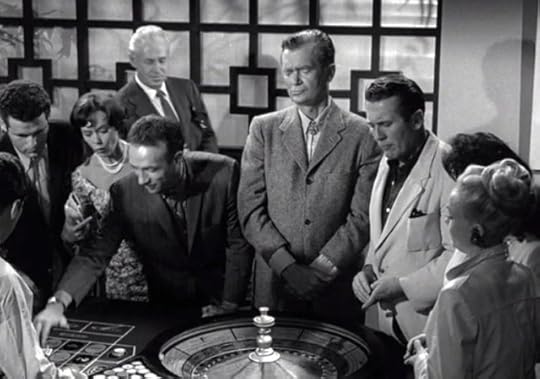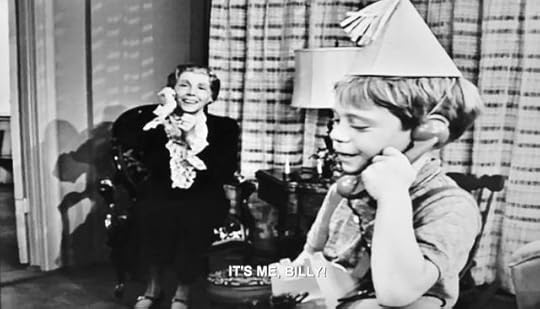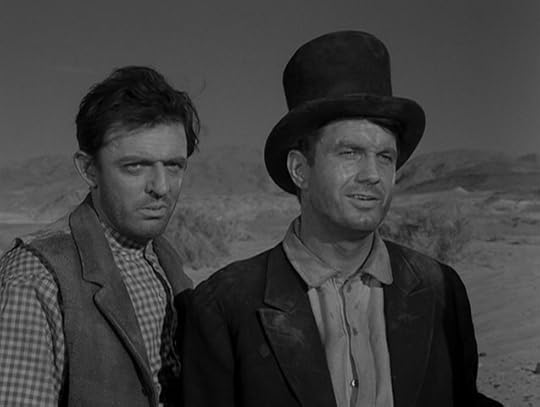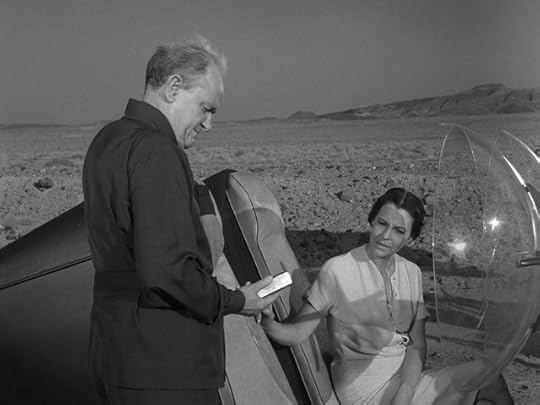Aguust 20, 2024: The Twilight Zone rewatch continues with season 2, episodes 21-24!
Season 2, Episode 21, “The Prime Mover”
This episode was first broadcast March 24, 1961.
George Clayton Johnson was instrumental in the creation of this episode but received no official credit. According to Johnson: “It was the original script by me, which Beaumont rewrites based upon a discussion between the two of us, takes the credit, collects the money, and gives me, I think $600 – which was an enormous sum to me at the time – for being the first-draft guy on that, and not taking the credit. Anything to get some writing done, get some experience, get things sold, not to fight for these credits but to understand the business, be willing to make a deal and stick with the deal – and all those things go on in an office where a writer is, that are different where a stock broker’s, or someone else.” Hmmmm.
Johnson struggled to beak in: “I would tell Rod and Buck different stories and most of the time they would shake their heads. “No, no George. Why not this one instead?” So I would suggest another story. “How about this?” And Buck woud say, “No, no, no.” Buck would only hold those meeetings once a month so I gathered all my notions and notes and would pay him a return visit. If he liked the idea, but wanted me to do something with it, I went back home and worked on it. That was how I got to write for the series.”
Writer Jerry Sohl on Charles Beaumont: He “was the best. He was able to intimidate producers – something we all wished we could do. For example, he went to see a certian pilot. They were really anxious to get him to write for the show. The first thing he said to the producer was “You’re what’s wrong with television. That pilot was a pilot of…” and the guy said “Why? What’s wrong?”. “Well, I’ll tell you what’s wrong with it…” Chuck then went on to some general things. When he got to the point where he said “Now I’ve got a story for you…” they were anxious and waitng to hear. He was able to do that with almost anybody, though not in the same manner.”
Rod Serling wrote a letter to Charles Beaumont after he submitted the revised script: “Just finished “The Prime Mover” and I have simply flipped! It’s a honey of a job and I thought, considering all the travail that exists between you and that miserable Twilight Zone, it might be a morale booster for you to know that your latest effort is a real corker!”
After the episode aired, production was contacted twice by a Mr. Stanley F. Skeris claiming the idea was possibly stolen from his short story “The Powers That Be or Not Be”. Serling wrote back: “You are obviously quite unaware of the copyright laws as they apply to material allegedly plagiarized. In so far as the similarity between our presentation “The Prime Mover” and your short story – I first of all see oly the vaguest of similiarity of theme. As a matter of fact the whole area of telekinetic powers is a common one in literature and appears in literally hundreds of stories. Neither ours not yours is unique in its approach and it once again emphasizes the very non-sacrosanct aspect of the material. In addition, you must realize, of course, Mr. Skeris, that we have no record of receiving your mateiral or indeed having any access to it. Since there is no signed release in your name it seems unquestionably the case that your material was never sent to us. If, of course, you want to pursue this matter further through a lawyer, my own legal representatives would be happy to respond with the necessary action.” Situations like these would grow increasingly more common as the show progressed.
The slot machine used in the opening was last seen in season 1’s “The Fever”.
The film clip of the car crash is from the end of Thunder Road (1958).
Actor Dane Clark, who played Ace Larsen, was an avid bowler and cook revered for his famed chiccken cacciatore. Iin 1946, Movie Life Magazine named him “the most stylish actor in Hollywood”. He apparently fell in love with actress Ida Lupino (“The Sixteen Millimeter Shrine”) and the two were planning to be married until Clark met her parents and, declaring them “leeches and freeloaders”, broke off the engagement.
Following the death of his first wife, he had every painting she ever made displayed through his California home as a reminder of her.
In 1955, while starring in a stage production of “The Shrike”, actress Isabel Bonner suffered a brain hemmorhage and died in his arms.
In 1996, director James Cameron asked Clark to come out of retirement to play Captain Edward John Smith in Titanic (1997), but Clark had to pass due to his failing health.
Buddy Ebsen, who played the telekinetic JImbo Cobb, originally intended to become a doctor, taking pre-med courses, before embarking on a career as a Broadway dancer. He auditioned for the lead in Davy Crockett but ended up playing his sidekick instead. In 1938, he turned down an exclusive contract with MGM, leading Louis B. Meyer to declare he’d never work in Hollywood again. But one year later, Ebsen was offered the part of the Tin Man in The Wizard of Oz. He became ill from the aluminum make-up and was replaced with actor Jack Haley who ended up using an altered make-up application.
Ebsen was considering retirement when he was offered the role of Jed Clampett on The Beverly Hillbillies (1962). Eleven years later, lightning struck twice and he landed Barnaby Jones (1973).
Actress Christine White, who played Kitty Cavanaugh, was James Dean’s girlfriend for three years while in New York. Togrether, they successfully audiitoned for The Actor’s Studio.
All in all, not a bad episode. I enjoyed the performances of our co-leads and, even though the ending was a little obvious, I really did like the upbeat ending.
Season 2, Episode 22, “Long Distance Call”
This episode was first broadcast March 31, 1961.
This was, mercifully, the last of the six episodes shot on video.
Writer Bill Idelson wrote an original story titled “Party Line” that he and Charles Beaumont adapted for the show.
The episode was subject to a last minute rewrite by Rod Serling who visited set and rewrote the dialogue of the father pleading with the grandmother over the phone.
According to Idelson: “Charles Beaumont was not involved with the rewrite. I didn’t know it at the time, but he had Alzheimer’s and he couldn’t type a word for the script. I still think Richard Matheson was involved with the first script before it was re-written.”
After the episode aired, the production was contacted by not one but TWO people claming the show stole their story ideas. The first, an unsolicited submission, was received after Idelson’s original script had been received so that was easy enough to prove. On the second one, they faced a plagiarism lawsuit. Idelson recalls: “I remember we sat down in the office of the guy’s attorney, and I had to explain how I came up with the iddea for the story. I told him about my son’s brithday party and how that was the inspiration for my story. When the attorney heard the whole thing, he said he wouldn’t represent someone who could not verify that we stole his story, so the charges were dropped.”
In the original script, the little boy was named Paulie. Also in the original script, the boy was found floating face down in the pool but Bill Mumy’s mother objected to the scene so it was shot in a way to avoid glimpsing the little floater.
Actress Lili Darvas, who played the grandmother, was a famous Hungarian actress who established an impressive career on Broadway, receiving a Tony Award nomination as Best Supporting or Featured Actress in Lorraine Hansberry’s “Les Blancs”. She also appeared on the big screen, earning a special award at Cannes for one of her final performances in “Szerelem” (1971).
Bill Mumy, who played young Billy, would return for two more Twilight Zone appearances. An accomplished musician, songwriter, writer and voice actor Mumy co-created the sci-fi series Space Cases (1996). He was the original choice for the role of Eddie Munster on The Munsters (1964), but his parents disapproved of the make-up so the role went to Butch Patrick (who remained good friends with Mumy). He is perhaps best known for his role as Will Robinson on Lost in Space (1965).
Jenny Maxwell, who played Shirley the babysitter, made t.v. appearances in the 50’s and 60’s, but her most notable role was as teen Ellie Corbett in Blue Hawaii (1961). In 1970, she married a man 21 years her senior, a lawyer named Ervin Roeder. The marriage was rocky and the couple was in the midst of a divorce when Maxwell went into the hospital for minor surgery. Against the advice of some of her friends, she allowed Roeder to pick her up from the hospital and take her to dinner. Later that night, at Roeder’s residence, she was shot and killed. Roeder, also shot and wounded, phoned for help but later died of his wounds. The murder remains unsolved but author Buddy Moorhouse, in his book Elvis Girl: Solving the Jenny Maxwell Case, suggests Roeder used his mob connections to set up his wife’s murder, orchestrating a scenario where he would only receive a superficial wound – only to have the wound prove fatal.
Although it suffered a bit from its video quality, I quite liked this episode. Again, I’m a big fan of the episodes that lean into the horror, and this one offers up a delightfully creepy premise. Although I find that, in retrospect, I tend to be a sucker for the occasional upbeat happy ending, I kind of wish the ending here had been darker. Dad dismisses mom’s claims that she heard his mother on the phone. Little Billy dies. The parents separate. Dad, alone at home, has the phone ring. He picks it up. And it’s Billy calling.
Still, a potential Season 2 Top 10 entry. We’ll see how the rest of the season pans out.
Season 2, Episode 23, “A Hundred Yards Over the Rim”
This episode was initially telecast April 6, 1961.
This was J.J. Abrams’ favorite Twilight Zone episode.
The sheriff’s patrol car featured is the Mayberry Sheriff’s Department patrol car from the second season of The Andy Griffth Show (1960).
Actor Cliff Robertson, who played wagon trail leader Chistian Horn, was selected by John F. Kenndy to play the young JFK in PT 109 (1963). His most memorable performance was as the titular character in Charly (1968), the feature adaptation of Daniel Keyes’ novel Flowers for Algernon. The role earned him an Academy Award.
Robertson passed on the role of Dirty Harry (that eventually went to Clint Eastwood). He and his wife, Dina Merrill, both played colorful villains in the 1966 Batman series. One of his later big screen appearances was as Uncle Ben in Spider-Man (2002).
An apparent stickler for details, Robertson did a deep dive into the history of the old west after he was offered the role. He insisted that, to be historically accurate, his charater should wear a stovepipe. Director Buzz Kulik, no doubt fearing that the quasi-comical hat would detract from the performance (to quote an equally lerry director Peter DeLuise in his reaction to a similar scenario on Stargate: SG-1 “It becomes a scene about a hat!”) suggested a historically inaccurate Stetson. After much back and forth, the decision was kicked upstairs to Rod Serling who, after having Robertson model the hat for him, agreed to let him wear it. According to Robertson: “And that’s the kind of guy Rod was – he was very supportive of his actors, and I will always be grateful to him.”
John Crawford, who played Sheriff Joe, was often cast as tough guys or villains. He was a frequent collaborator with Irwin Allen, appearing in six of the Master of Disaster’s productions including The Poseidon Adventure and The Towering Inferno.
Evan Evans, who played Mary Lou, was known for Bonnie and Clyde (1967), The Iceman Cometh (1973), and Dead Bang (1989). She was married to director John Frankenheimer.
Ed Platt (aka Edward Platt), who played the doctor, attended Juilliard with the intention of becoming an opera singer. After serving as a radio operator in WWII, he found success on Broadway as a vocalist. He moved to Hollywood and gained notice for his performance as James Dean’s sympathetic juvenile officer in Rebel Without a Cause (1955). The role ended up landing him an audition, and the role of The Chief on Get Smart (1965). According to series co-creator Leonard Stern, Platt broke into song, immediately endearing himself to the producers.
Platt’s death in 1974 was initially attributed to a heart attack but, years later, his son revealed that his father had taken his own life following a lengthy battle with depression compounding by financial hardships.
I liked the episode and enjoyed the set-up and the performances even though the ending was heavily telegraphed. Also, with all due respect to Robertson and Serling, I found that stovepipe hat unintentionally goofy-looking and distracting. This one is highly ranked among the fandom and while I respect that, I can safely predict it won’t be making my season 2 Top 10 list (unless, of course, the next six episodes prove dire).
Season 2, Episode 24, “The Rip Van Winkle Caper”
This episode was initially telecast April 24, 1961.
The futuristic vehicle featured at the end of the episode is a modified version of Robby the Robot’s car from Forbidden Planert (1956).
1 million dollars in gold in 1961 at a price of $35.50 an oz would be worth almost 70 million dollars today.
This episode was shot back-to-back with “One Hundred Yards Over the Rim”.
Actor Simon Oakland, who played the scheming De Cruz, played a lot of good-hearted tough guy roles in his career. He maintained residences in both New York and California so that he could split time between Broadway and the big screen.
Oscar Beregi Jr., wh played the erudite Farwell, was a Hungarian actor who actually didn’t start acting until he was forty. His bread and butter was playing accented villains. He played mobster Joe Kulak in eight episodes of The Untouchables 1959). After this episode of The Twilight Zone, he would return for one more, playing an SS Commandant in “Deaths-Head Revisited”.
John Mitchum, who played the doomed Erbie, was perhaps best known as Frank DiGiorgio, Dirty Harry’s partner in the first three Dirty Harry movies. He is also known for his portrayal of the German-speaking Pvt. Hoffman in F Troop (1965).
I always enjoy the sci-fi-themed episodes, this one a little less so because it was a little more ludicrous than the norm. I note Serling “paid tribute” to this episode in his script work on The Planet of the Apes, borrowing the scene where one of the stasis chambers breaks, leading the crew to discover the skeletal remains of their friend. About that…what, exactly, is keeping them in stasis? I assumed the gas, but if that was the case, wouldn’t the gas have dispersed when the chamber was shattered, causing Erbie to wake up? And speaking of Erbie, what the hell happened to the poor guy’s clothes? Did rats access the chamber and make off with his pants? Also, why did De Cruz’s plot to kill Brooks require him to drive the car off the cliff?
All in all, this one way fine. I liked the twist – even though you knew it was coming the second they started lugging around those extra-light gold bars. I’m slotting it in at #10 on this season 2 rewatch. We’ll see if any of the final five episodes of season 2 manage to squeeze it out. Likely since the final two episodes are pretty highly-rated.
The post Aguust 20, 2024: The Twilight Zone rewatch continues with season 2, episodes 21-24! appeared first on Joseph Mallozzi's Weblog.
Joseph Mallozzi's Blog
- Joseph Mallozzi's profile
- 39 followers







